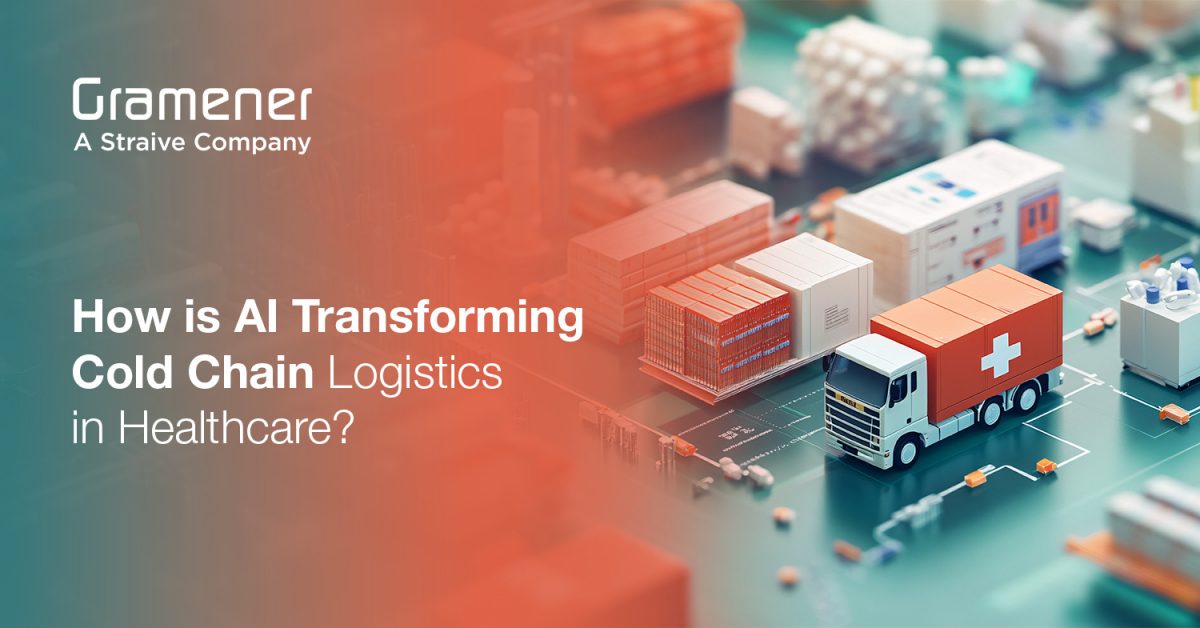In 2022, Americans spent USD 4.5 trillion on healthcare or USD 13,493 per person, a 4.1 percent rise over the previous years.
According to WHO, global healthcare spending has reached unprecedented heights, with a staggering USD 9.8 trillion invested in healthcare in 2021 alone.
Healthcare costs have increased across the world, and some reasons are:

According to WHO, healthcare expenses account for about 10.3% of the global gross domestic product (GDP).
There is a silver lining amidst these challenges: Artificial Intelligence (AI) is revolutionizing healthcare logistics, including critical areas like cold chain management.
Cold chain logistics ensures that temperature-sensitive products like vaccines and biologics are transported and stored under controlled conditions to maintain efficacy.
By leveraging AI technologies, healthcare providers can streamline operations to reduce costs, improve patient outcomes, and enhance the integrity of cold chain processes.
Learn how Gen AI can revolutionize the pharma supply chain in our latest whitepaper, download it now, and discover the future of pharmaceutical logistics.
This integration of AI into healthcare logistics represents a transformative approach that addresses operational efficiency and patient safety.
Table of Contents
The Evolution of Cold Chain in Healthcare
The cold chain ecosystem has undergone significant transformations in recent years, driven primarily by technological advancements and the increasing demand for temperature-controlled logistics in the healthcare industry.
Read our blog to learn more about Pharma Supply Chain challenges and how to solve them with GenAI
Traditionally, cold chain management focused on preserving vaccines and biologics, but today, its scope has widened to include a broader range of temperature and time-sensitive pharmaceuticals and medical supplies.
This shift has led to the development of more sophisticated cold chain solutions designed to ensure the integrity and efficacy of these sensitive products throughout the entire supply chain.
The increasing demand for temperature-controlled pharmaceutical storage and delivery, especially in immunotherapy, gene therapy, and oncology, is a key driver behind this growth.
Precise temperature control is necessary to preserve these therapies’ potency and effectiveness, making dependable and effective cold chain solutions crucial.
Because of this, cold chain logistics companies spend money on advanced technologies, such as real-time tracking and monitoring systems, to ensure these delicate goods are handled and stored with utmost care.
Business Challenges
Maintaining an effective cold chain has long been challenging for the healthcare industry. The cold chain logistics have suffered from challenges like:
- Inadequate Visibility and Transparency: The lack of clear information/data across the logistical chain can hinder tracking products, building stakeholder trust, and maintaining customer confidence in cold chain operations.
- Insufficient Regulatory Compliance Tools: The increasing regulatory requirements for pharmaceutical cold chain companies can be challenging because few practical tools exist to keep up with the changes, making regulatory reporting a significant hurdle.
- Unreliable Cold Chain Data: The risk of data tampering in cold chain databases, driven by commercial interests, can compromise the integrity of the data, making it unreliable for decision-making and compliance purposes.
Other challenges include:
| Temperature Variation | Equipment Failure | Human Error | Infrastructure Limitations | Regulatory Compliance |
| Temperature fluctuations during transportation and storage can severely impact the quality of medicines. | Cooling equipment breakdown can result in temperature fluctuations, putting medicines at risk. | Human mistakes, such as improper loading or unloading procedures, can compromise the cold chain. | Inadequate refrigeration facilities or storage capacity can hinder efficient transportation and storage. | Ensuring compliance with regulatory requirements, such as Good Distribution Practices (GDP) and Good Manufacturing Practices (GMP), can be challenging for cold chain logistics providers. |
Get The Savior in AI
AI has the potential to significantly improve cold chain logistics for healthcare in several ways, including efficiency, compliance, and patient outcomes protection. The following are some major advantages:
1. Real-Time Temperature Monitoring: Devices with integrated AI/IoT technology allow for continuous monitoring of temperatures throughout the cold chain. They provide real-time data on temperature fluctuations, enabling immediate corrective actions if the temperature deviates. Thus, they ensure the integrity of temperature-sensitive products like vaccines and biologics.
2. Predictive Analytics: AI systems can predict problems before they arise by analyzing historical temperature data. AI can minimize product spoiling due to temperature excursions by spotting patterns and anomalies and notifying staff to take preventive action.
3. Enhanced Route Optimization: AI can improve delivery routes by considering various variables, including weather, delivery windows, and traffic patterns. This optimization contributes to more environmentally friendly operations in healthcare logistics by ensuring on-time deliveries and reducing fuel usage and emissions.
4. Improved Inventory Management: Thanks to AI-driven inventory management solutions, healthcare companies can see stock levels and consumption trends in real time. This feature ensures that inventory is maintained effectively based on actual demand, which lowers waste and helps prevent the no-stock situation of essential cold chain products.
5. Automated Compliance Reporting: AI can expedite regulatory compliance procedures by monitoring temperature records and producing automated reports. This guarantees compliance with safety regulations and lessens the administrative strain on healthcare professionals.
6. Enhanced Data Analytics: AI solutions facilitate enhanced analysis of supply chain data, assisting healthcare businesses in seeing patterns, monitoring progress, and making well-informed choices about their cold chain logistics. This realization is essential to enhancing patient care and operational effectiveness.
7. Cost Savings: AI has the potential to significantly reduce costs for healthcare providers by enhancing the efficiency of inventory management, routing, and monitoring. These savings could be used to fund more technical breakthroughs or to improve patient care services.
How Can Gramener Help?
Gramener – A Straive Company harnesses advanced AI and data analytics to tackle the cold chain industry’s biggest challenges, including temperature control, logistics optimization, and regulatory compliance.
Our real-time monitoring and predictive analytics solutions help businesses minimize spoilage, enhance efficiency, and ensure product quality throughout the supply chain.
By offering tailored AI-driven strategies, we help companies reduce operational costs and improve overall performance.
Partnering with Gramener – A Straive Company provides businesses in the cold chain sector with the tools and insights needed to thrive in an increasingly competitive market.

